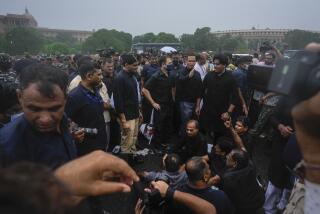India attempts damage control in wake of corruption scandals
- Share via
Reporting from Bhavnagar, India — Indian Prime Minister Manmohan Singh sought with a rare news conference Wednesday to regain momentum after a string of corruption scandals that have paralyzed Parliament, put off foreign investors and angered voters.
Analysts, however, said the attempt may have backfired.
A rash of alleged irregularities connected to sports, telecommunications and real estate deals, potentially involving tens of billions of dollars, has contributed to a perception that the Congress Party-led government is adrift and the prime minister increasingly ineffectual.
Singh, 78, an economist by training and understated by nature, has given only a handful of extended public news conferences in his seven years as national leader. But few analysts seemed impressed when he stepped forward Wednesday to defend his administration.
“He was very defensive and not very convincing,” said Mahesh Rangarajan, a professor at Delhi University. “It’s clear he’s not happy with what happened. It’s not clear what he intends to do about it. He lost an opportunity today.”
Although Singh’s personal integrity is generally considered above suspicion, his oversight role has come under increasing scrutiny as the disclosures have mounted.
If Singh didn’t know about the alleged irregularities going on around him, his leadership should be called into question, and if he knew, he should have halted them, said Suhel Seth, managing partner with Counselage India, a marketing consultancy.
“There’s more damage in a failed press conference than in not having one,” Seth said. “It was too little, too late.”
In a 70-minute televised session that saw some heated questioning, Singh promised that corrupt officials would be punished. He said he didn’t plan to resign despite the difficulties and pledged to reshuffle his Cabinet once Parliament passed the budget, which is slated to happen by early May.
“It is a big regret that these irregularities have happened,” Singh said, looking dispirited. “I don’t say I have not committed a mistake ever. But I’m not such a big culprit as is being made out.”
But political opponents said he should take responsibility for including in his Cabinet former Telecommunications Minister Andimuthu Raja, who was arrested this month on suspicion of under-pricing mobile phone broadband spectrum licenses at a potential loss to the government of up to $39 billion.
Singh’s assertion that he had no choice but to accept Raja as a minister because other members of the coalition government insisted on the appointment doesn’t hold water, said Arun Jaitley, a senior opposition leader. “He conveniently passes the buck,” Jaitley said.
Other recent scandals involve contracts leading up to the Commonwealth Games last year, in which tens of millions of dollars in taxpayer funds were allegedly siphoned off, and illegal construction of a 31-story apartment complex in Mumbai. The latter project was built on military land intended for war widows that was sold at a steep discount to well-connected politicians and bureaucrats.
Beyond the immediate political battle are more fundamental issues affecting India’s future, some analysts added, namely crony capitalists and their political handmaidens who pull the policy strings, undermining public faith in government.
Singh in his opening remarks faulted the media for its aggressive coverage of scandals, saying it has tarred the nation’s global reputation.
“An impression has gone out that we are a scam-driven country,” he said. “It hurts the self-confidence of the people.”
But some analysts said the blame was misdirected. “The media did its job,” Rangarajan said. “In any democracy, political leaders in trouble tend to blame the media.”
Anshul Rana in The Times’ New Delhi Bureau contributed to this report.
More to Read
Sign up for Essential California
The most important California stories and recommendations in your inbox every morning.
You may occasionally receive promotional content from the Los Angeles Times.









